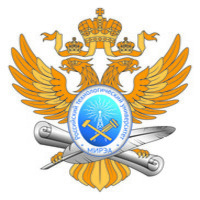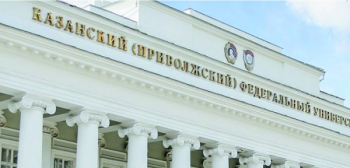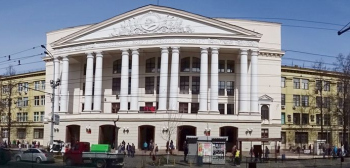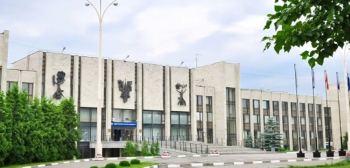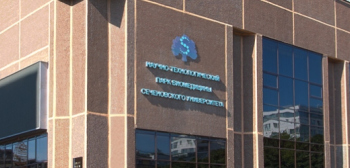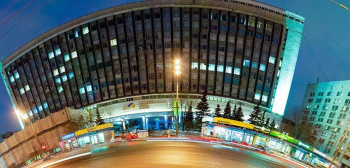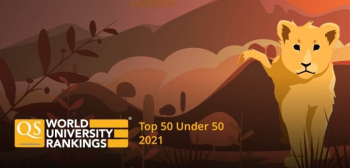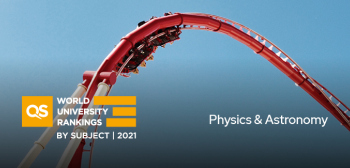- #1401+ QS Global World Ranking
- PublicStatus
- Very HighResearch Output
- 29,965Total Students
- 1,678Faculty
- 1,200Int'l Students
The University’s position in the current QS World University Rankings.
Whether the University is funded by the government of that country or state, or funded by private donations.
The research intensity of the University, based on the number of papers output relative to the University’s size.
The number of full time equivalent students enrolled at the University.
The number of full time equivalent teaching staff employed by the University.
The number of full time equivalent international students enrolled at the University.
MIREA - Russian Technological University
About
Recognized both in Russia and abroad as a modern educational and research center, MIREA — Russian Technological University combines classical university traditions with modern educational technologies in its work. Since its creation, this higher education institution has always kept up to date constantly expanding the range of academic programs according to the State demand for engineering staff, enhancing the quality of specialists’ training and achieving international recognition.
MIREA - Russian Technological University is one of the leading universities in the training of highly qualified specialists for quickly developing knowledge-intensive branches of science and technology: telecommunications, information and computer technologies, automatic equipment, cybernetics, radio engineering and electronics, chemistry and biotechnologies.
The training level of the students is high and the University graduates have no employment problems enjoying great demand in all spheres related to the development and use of nanotechnologies, telecommunication and information systems, robotics, chemical technology, and health care.
The University offers a wide variety of training services to suit various kinds of persons ranging from pupils uncertain about their aspirations to mature, experienced specialists, scientists, scholars and teachers.
In the framework of education in the Russian Federation, the University conducts training generally resulting in the following degrees: Bachelor’s, Specialist’s, Master’s and PhD where Bachelor’s/Specialist’s defined as undergraduate education. Persons eligible for these programs must possess a secondary education certificate or a primary or secondary vocational education diploma. Bachelor’s program duration is 4 - 4,5 years, while Specialist’s is 5 - 5,5 years. Upon completing Bachelor’s program, students are certified as a Bachelor and may continue training for a Master’s degree.
Bachelor’s Programs:
01.03.02 Applied Mathematics and Computer Science
01.03.04 Applied Mathematics
04.03.01 Chemistry
05.03.03 Cartography and Geoinformatics
09.03.01 Computer Science and Computer Engineering
09.03.02 Information Systems and Technologies
09.03.03 Applied Computer Science
09.03.04 Software Engineering
11.03.01 Radio Engineering
11.03.02 Infocommunication Technologies and Communication Systems
11.03.03 Designing and Technology of Electronics
11.03.04 Electronics and Nanoelectronics
12.03.01 Instrument Engineering
12.03.02 Optics Engineering
12.03.04 Biotechnical Systems and Technologies
12.03.05 Laser Engineering and Laser Technology
15.03.01 Mechanical Engineering
15.03.04 Automation of Technological Processes and Production
15.03.06 Mechatronics and Robotics
18.03.01 Chemical Engineering
19.03.01 Biotechnology
20.03.01 Technosphere Safety
22.03.01 Materials Science and Materials Processing Technologies
27.03.01 Standardization and Metrology
27.03.04 Technical Systems Management
27.03.05 Innovatics
28.03.01 Nanotechnologies and Microsystem Equipment
29.03.04 Technology of Art Processing of Materials
38.03.01 Economics
38.03.02 Management
38.03.04 State and Municipal Management
38.03.05 Business Informatics
40.03.01 Law
46.03.02 Document Science and Archive Science
54.03.01 Design
All modes of study are available at the University, in particular: full time, blended training including distant training.
A number of education programs are partly carried out by means of e-training via the internet. Learning materials, student’s guidebooks, tests, etc. are available via e-training provided by the University Distant Training Center.
After graduation, MIREA – Russian Technological University graduates have an opportunity to get a European Diploma Supplement (Diploma Supplement), developed in accordance with all standards of the Council of Europe and UNESCO. It describes the content, quality and status of learning successfully completed by the holder of the Diploma in English, thereby allowing international recognition of the qualifications for further studies, in both academic and professional capacity.
...About
Recognized both in Russia and abroad as a modern educational and research center, MIREA — Russian Technological University combines classical university traditions with modern educational technologies in its work. Since its creation, this higher education institution has always kept up to date constantly expanding the range of academic programs according to the State demand for engineering staff, enhancing the quality of specialists’ training and achieving international recognition.
MIREA - Russian Technological University is one of the leading universities in the training of highly qualified specialists for quickly developing knowledge-intensive branches of science and technology: telecommunications, information and computer technologies, automatic equipment, cybernetics, radio engineering and electronics, chemistry and biotechnologies.
The training level of the students is high and the University graduates have no employment problems enjoying great demand in all spheres related to the development and use of nanotechnologies, telecommunication and information systems, robotics, chemical technology, and health care.
The University offers a wide variety of training services to suit various kinds of persons ranging from pupils uncertain about their aspirations to mature, experienced specialists, scientists, scholars and teachers.
In the framework of education in the Russian Federation, the University conducts training generally resulting in the following degrees: Bachelor’s, Specialist’s, Master’s and PhD where Bachelor’s/Specialist’s defined as undergraduate education. Persons eligible for these programs must possess a secondary education certificate or a primary or secondary vocational education diploma. Bachelor’s program duration is 4 - 4,5 years, while Specialist’s is 5 - 5,5 years. Upon completing Bachelor’s program, students are certified as a Bachelor and may continue training for a Master’s degree.
Bachelor’s Programs:
01.03.02 Applied Mathematics and Computer Science
01.03.04 Applied Mathematics
04.03.01 Chemistry
05.03.03 Cartography and Geoinformatics
09.03.01 Computer Science and Computer Engineering
09.03.02 Information Systems and Technologies
09.03.03 Applied Computer Science
09.03.04 Software Engineering
11.03.01 Radio Engineering
11.03.02 Infocommunication Technologies and Communication Systems
11.03.03 Designing and Technology of Electronics
11.03.04 Electronics and Nanoelectronics
12.03.01 Instrument Engineering
12.03.02 Optics Engineering
12.03.04 Biotechnical Systems and Technologies
12.03.05 Laser Engineering and Laser Technology
15.03.01 Mechanical Engineering
15.03.04 Automation of Technological Processes and Production
15.03.06 Mechatronics and Robotics
18.03.01 Chemical Engineering
19.03.01 Biotechnology
20.03.01 Technosphere Safety
22.03.01 Materials Science and Materials Processing Technologies
27.03.01 Standardization and Metrology
27.03.04 Technical Systems Management
27.03.05 Innovatics
28.03.01 Nanotechnologies and Microsystem Equipment
29.03.04 Technology of Art Processing of Materials
38.03.01 Economics
38.03.02 Management
38.03.04 State and Municipal Management
38.03.05 Business Informatics
40.03.01 Law
46.03.02 Document Science and Archive Science
54.03.01 Design
All modes of study are available at the University, in particular: full time, blended training including distant training.
A number of education programs are partly carried out by means of e-training via the internet. Learning materials, student’s guidebooks, tests, etc. are available via e-training provided by the University Distant Training Center.
After graduation, MIREA – Russian Technological University graduates have an opportunity to get a European Diploma Supplement (Diploma Supplement), developed in accordance with all standards of the Council of Europe and UNESCO. It describes the content, quality and status of learning successfully completed by the holder of the Diploma in English, thereby allowing international recognition of the qualifications for further studies, in both academic and professional capacity.
...University highlights
- 2022#1201+
- 2023#1201-1400
- 2024#1401+
- 2025#1401+
Campus locations
Campus in 78 Vernadskogo Avenue (MIREA),
78 Vernadskogo Avenue , Moscow , Russia , 119454
Campus in 86 Vernadskogo Avenue (MITHT),
86 Vernadskogo Avenue , Moscow , Russia , 119571
Campus in Stromynka Street (MGUPI),
20 Stromynka Street , Moscow , Russia , 107996
Campus in Malaya Pirogovskaya Street,
1 Malaya Pirogovskaya Street , Moscow , Russia , 119435
Campus in Sokolinaya Gora Street,
22 5th Street of Sokolinaya Gora , Moscow , Russia , 105275
Campus in Mir Avenue,
119 Mir Avenue, Block 312 , Moscow , Russia , 129334
Campus in Shchipkovsky Lane,
23 1st Shchipkovsky Lane , Moscow , Russia , 115093
Campus in Usachev Street,
64 Usachev Street, Block 1 , Moscow , Russia , 119048
Similar Universities
Russian Institute of Theatre Arts (GITIS)
Maly Kislovskiy Lane, 6, Moscow
Kazan (Volga region) Federal University
18 Kremlyovskaya st., Kazan
=392 QS World University RankingsSamara National Research University (Samara University)
34, Moskovskoe shosse St., Samara
4 QS starsNational Research University Moscow Power Engineering Institute (MPEI)
National Research University Moscow Power Engineering Institute, Moscow
Sechenov University
8-2 Trubetskaya street, Moscow
Plekhanov Russian University of Economics
Stremyanny per. 36, Moscow
751-800 QS World University RankingsThe National University of Science and Technology MISIS
Leninskiy Prospekt 4, NUST MISIS, Moscow
=451 QS World University RankingsRelated content
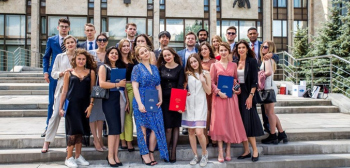
Why Russia is the Perfect St…
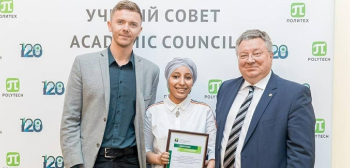
From Morocco to Russia: My S…

What Does Russia Have to Off…
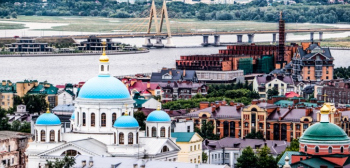
Study in Kazan
Test preparations
Featured University


-
10 UG & 47 PGTotal courses
-
Private for ProfitStatus
-
HighResearch output
